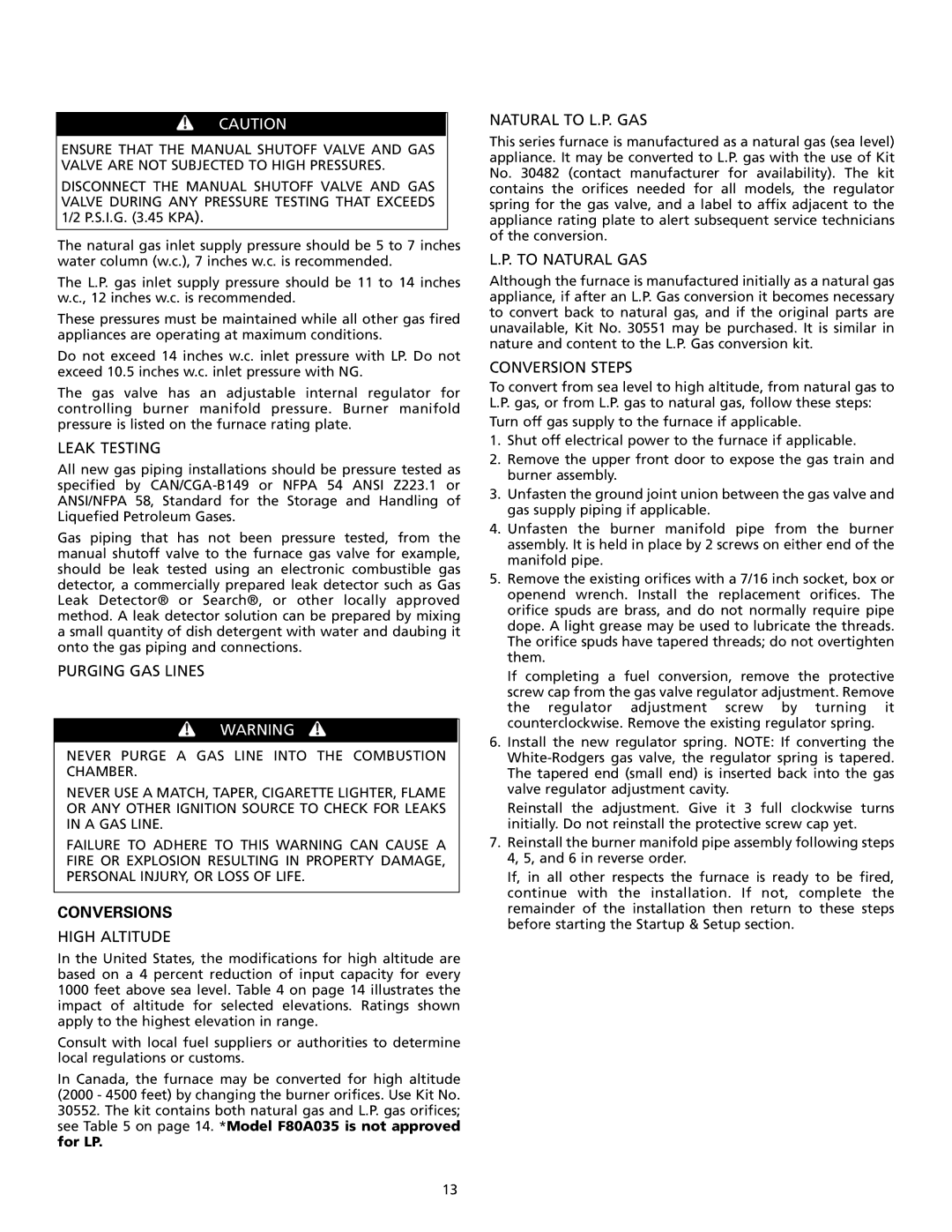MODEL F80A
CAUTION
ENSURE THAT THE MANUAL SHUTOFF VALVE AND GAS VALVE ARE NOT SUBJECTED TO HIGH PRESSURES.
DISCONNECT THE MANUAL SHUTOFF VALVE AND GAS VALVE DURING ANY PRESSURE TESTING THAT EXCEEDS 1/2 P.S.I.G. (3.45 KPA).
The natural gas inlet supply pressure should be 5 to 7 inches water column (w.c.), 7 inches w.c. is recommended.
The L.P. gas inlet supply pressure should be 11 to 14 inches w.c., 12 inches w.c. is recommended.
These pressures must be maintained while all other gas fired appliances are operating at maximum conditions.
Do not exceed 14 inches w.c. inlet pressure with LP. Do not exceed 10.5 inches w.c. inlet pressure with NG.
The gas valve has an adjustable internal regulator for controlling burner manifold pressure. Burner manifold pressure is listed on the furnace rating plate.
LEAK TESTING
All new gas piping installations should be pressure tested as specified by CAN/CGA-B149 or NFPA 54 ANSI Z223.1 or ANSI/NFPA 58, Standard for the Storage and Handling of Liquefied Petroleum Gases.
Gas piping that has not been pressure tested, from the manual shutoff valve to the furnace gas valve for example, should be leak tested using an electronic combustible gas detector, a commercially prepared leak detector such as Gas Leak Detector® or Search®, or other locally approved method. A leak detector solution can be prepared by mixing a small quantity of dish detergent with water and daubing it onto the gas piping and connections.
PURGING GAS LINES
WARNING
NEVER PURGE A GAS LINE INTO THE COMBUSTION CHAMBER.
NEVER USE A MATCH, TAPER, CIGARETTE LIGHTER, FLAME OR ANY OTHER IGNITION SOURCE TO CHECK FOR LEAKS IN A GAS LINE.
FAILURE TO ADHERE TO THIS WARNING CAN CAUSE A FIRE OR EXPLOSION RESULTING IN PROPERTY DAMAGE, PERSONAL INJURY, OR LOSS OF LIFE.
CONVERSIONS
HIGH ALTITUDE
In the United States, the modifications for high altitude are based on a 4 percent reduction of input capacity for every 1000 feet above sea level. Table 4 on page 14 illustrates the impact of altitude for selected elevations. Ratings shown apply to the highest elevation in range.
Consult with local fuel suppliers or authorities to determine local regulations or customs.
In Canada, the furnace may be converted for high altitude (2000 - 4500 feet) by changing the burner orifices. Use Kit No. 30552. The kit contains both natural gas and L.P. gas orifices; see Table 5 on page 14. *Model F80A035 is not approved
for LP.
NATURAL TO L.P. GAS
This series furnace is manufactured as a natural gas (sea level) appliance. It may be converted to L.P. gas with the use of Kit No. 30482 (contact manufacturer for availability). The kit contains the orifices needed for all models, the regulator spring for the gas valve, and a label to affix adjacent to the appliance rating plate to alert subsequent service technicians of the conversion.
L.P. TO NATURAL GAS
Although the furnace is manufactured initially as a natural gas appliance, if after an L.P. Gas conversion it becomes necessary to convert back to natural gas, and if the original parts are unavailable, Kit No. 30551 may be purchased. It is similar in nature and content to the L.P. Gas conversion kit.
CONVERSION STEPS
To convert from sea level to high altitude, from natural gas to L.P. gas, or from L.P. gas to natural gas, follow these steps:
Turn off gas supply to the furnace if applicable.
1.Shut off electrical power to the furnace if applicable.
2.Remove the upper front door to expose the gas train and burner assembly.
3.Unfasten the ground joint union between the gas valve and gas supply piping if applicable.
4.Unfasten the burner manifold pipe from the burner assembly. It is held in place by 2 screws on either end of the manifold pipe.
5.Remove the existing orifices with a 7/16 inch socket, box or openend wrench. Install the replacement orifices. The orifice spuds are brass, and do not normally require pipe dope. A light grease may be used to lubricate the threads. The orifice spuds have tapered threads; do not overtighten them.
If completing a fuel conversion, remove the protective screw cap from the gas valve regulator adjustment. Remove the regulator adjustment screw by turning it counterclockwise. Remove the existing regulator spring.
6.Install the new regulator spring. NOTE: If converting the White-Rodgers gas valve, the regulator spring is tapered. The tapered end (small end) is inserted back into the gas valve regulator adjustment cavity.
Reinstall the adjustment. Give it 3 full clockwise turns initially. Do not reinstall the protective screw cap yet.
7.Reinstall the burner manifold pipe assembly following steps 4, 5, and 6 in reverse order.
If, in all other respects the furnace is ready to be fired, continue with the installation. If not, complete the remainder of the installation then return to these steps before starting the Startup & Setup section.

